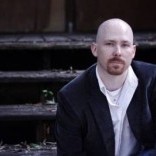Burnt
Margaret Adams
I left the city for less than 24 hours. That was all the time it took for the rowhouse across from me in my narrow alleyway to catch on fire and gut itself, turning its interior into clumpy, ashen debris. I expected a gap, like a pulled tooth in the lower jaw of my street. Instead, I found a perfect shell—windows, walls, door—their smoke-blackened hue an odd contrast to the new light streaming through the spaces left by roof, window shades, and furniture.
It rained that week, and all the next, and the sidewalk soon was heaped with piles of sodden, burnt interior as crews periodically scraped the contents of the shell outside. I stopped sometimes to look at the mounds, poking at them with a sneaker toe—book bindings? Door frames? Lamps? Sofa? It was impossible to tell what anything once was. The strangest thing of all, though, was how it smelled. I expected a foul odor of burnt plastic and charred paint, lingering on the block like an indigent chain-smoker. Instead it just smelled like charcoal. The bank of burnt apartment innards outside was unidentifiable, foreign and far removed from the individual objects it once represented. The smell, though, was all too familiar—the smell of grilling, woodstoves, and summer barbecues.
It’s the echoes of familiarity, not the strange and unrecognizable, which are most unsettling in demise. Every time the wind blew, my stomach growled, clenching with a sudden, unapologetically human craving for a burger, and guilt for my body’s response to someone else’s tragedy.




